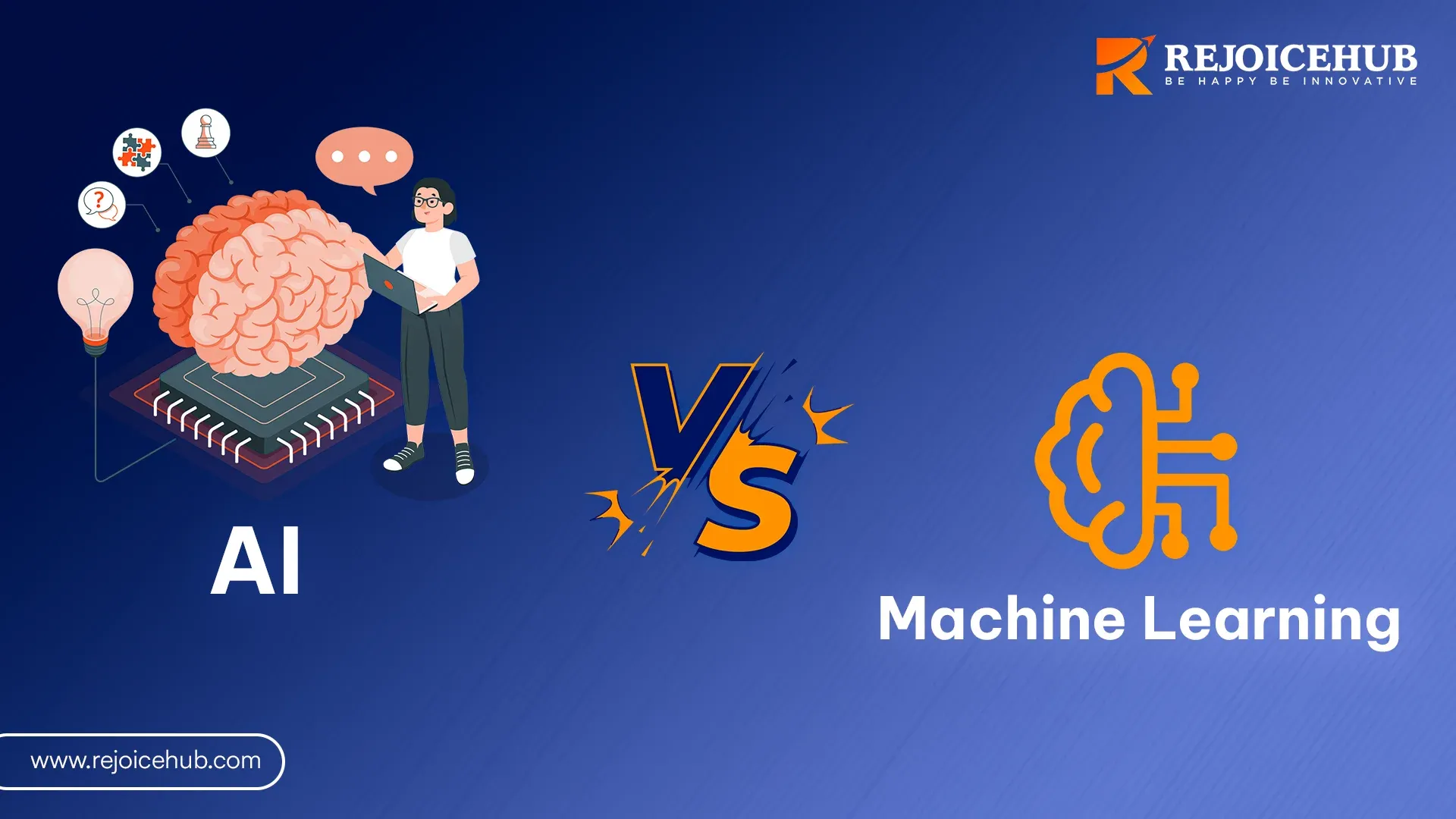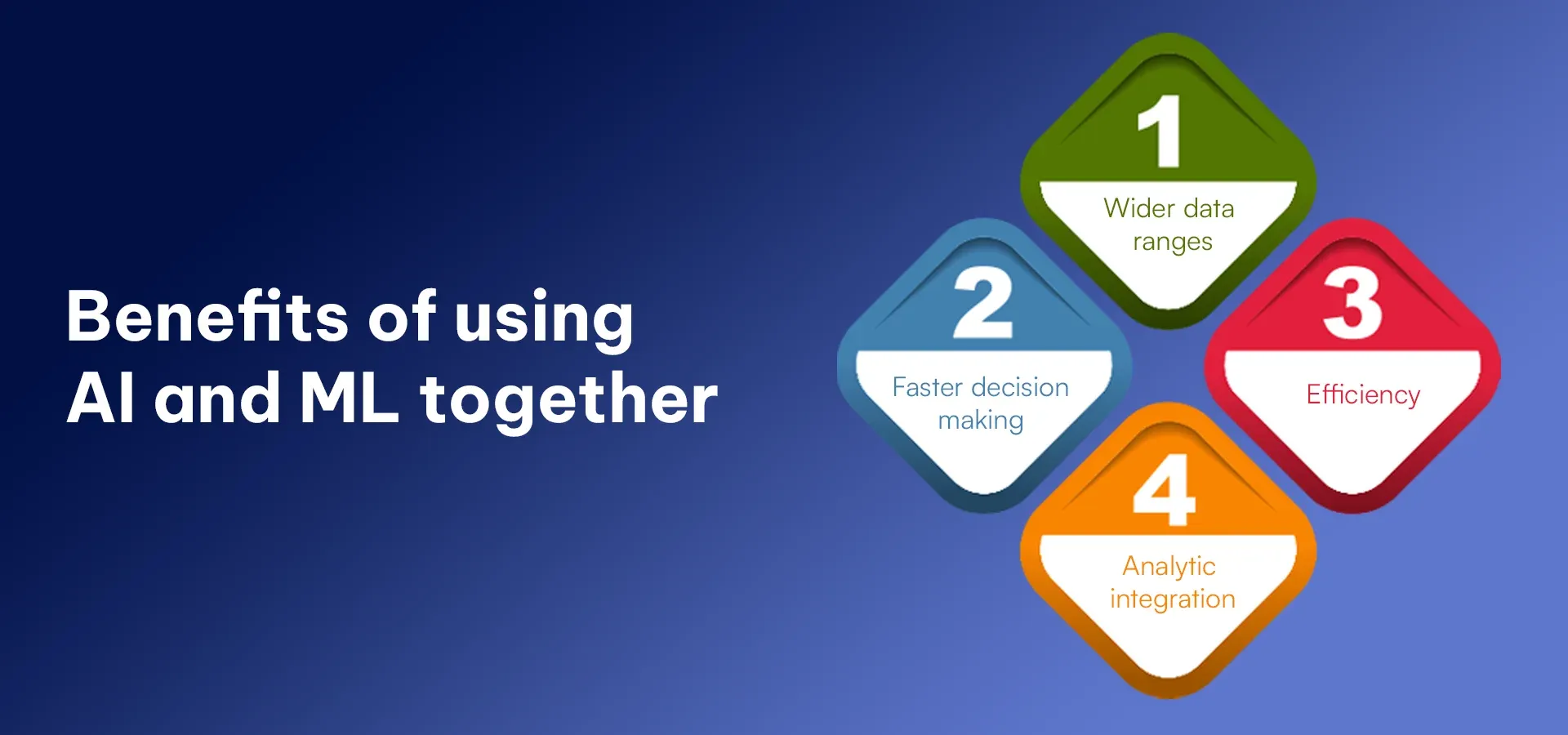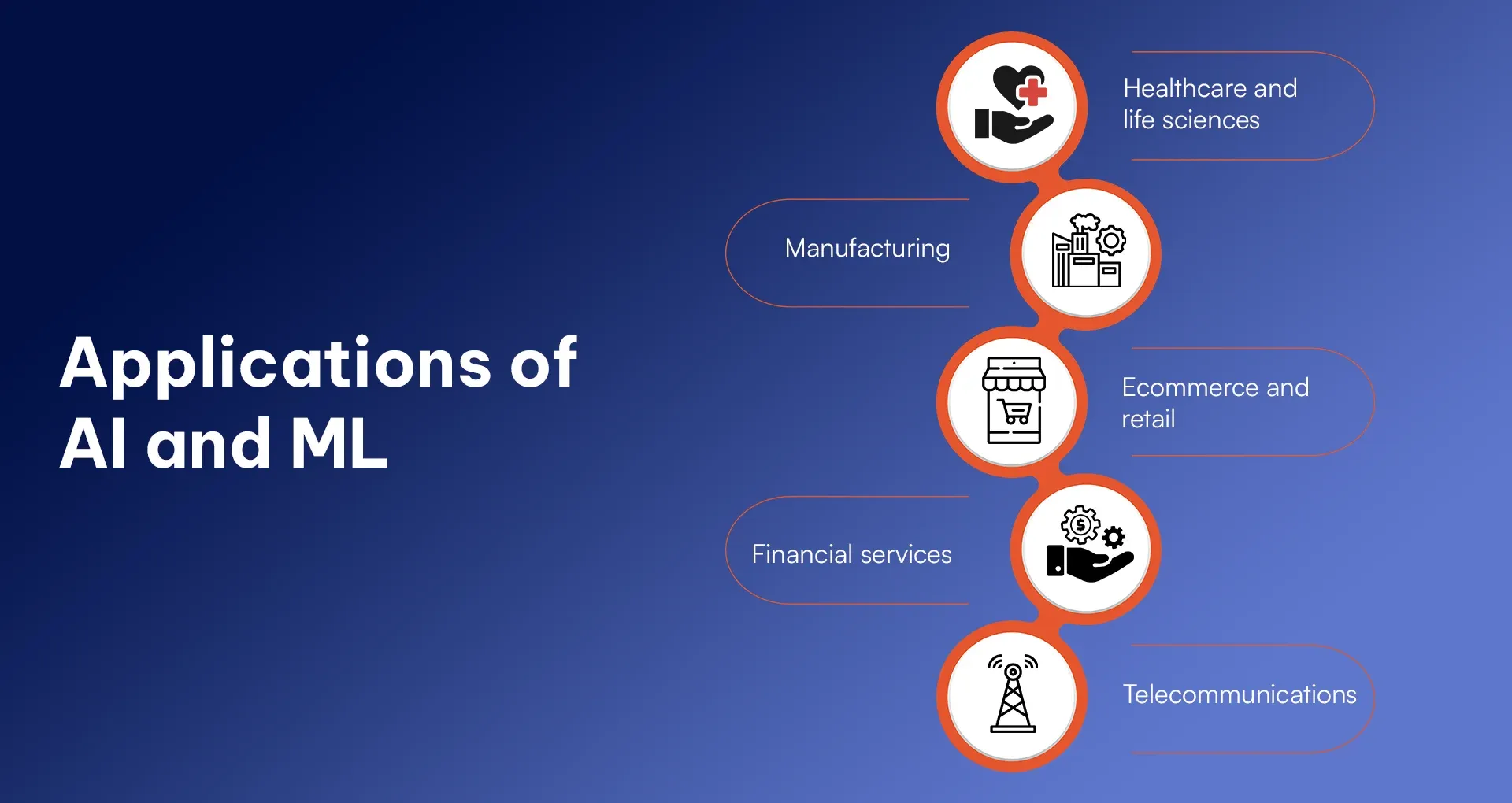
Artificial intelligence and machine learning—although the two buzzwords are often called out together, they are not the same thing. They are cousins in the technology field, having close but separate relationships. Although both are changing the future, knowing the difference between artificial intelligence and machine learning can clear the way for their distinctive functions in innovation.
Let us dissect the concept and look at them from different angles, through their differences, and also in terms of the connection they share, and from there we will see the reasons for their combination and the way it increases business productivity and efficiency.
Quick Summary
Artificial intelligence (AI) covers all the machines that are designed to simulate the human mind and functions. Machine learning (ML), nevertheless, is a segment of AI that addresses learning by data training of algorithms. AI as a master builder and ML as a concrete mixer.
What Is Machine Learning?
Machine learning is the way of educating a computer to make its own decisions, talking about patterns and data. You do the programming to some of the conditions but you offer various situations for the rest, and the computer is acquainted with them in order to be able to deal with them.
An example is a streaming service suggesting shows according to your watch history, which is machine learning at work. Modifications of data, calculation of the results, and self-improvement are the main issues handled by algorithms. ML is successful in cases that involve variability, such as voice recognition, scam identification, and individualized marketing.
But remember: ML isn’t the full picture. It’s one part of AI’s grand scheme.
What Is Artificial Intelligence?
Artificial intelligence (AI) is concerned with the design of systems that "think." AI has surpassed the pure implementation of didactic provocation in its aspiration for modeling the human cognitive process. From voice assistants like Siri to self-driving cars, AI is involved in any domain that deals with mimicking human intelligence.
AI spans across various levels:
- Narrow AI focuses on specific tasks (think spam filters).
- General AI aims to perform any intellectual task humans can do (still largely theoretical).
- Super AI? Well, that’s the futuristic stuff of sci-fi dreams.
In short, AI is the brain, while ML is the learning mechanism feeding that brain.
Key Difference Between Artificial Intelligence and Machine Learning
Here’s the big reveal: while all machine learning is AI, not all AI is machine learning. AI is the larger concept, and ML is a subset of it. Let’s learn more about the difference between AI and ML.
| Feature | Artificial Intelligence (AI) | Machine Learning (ML) |
|---|---|---|
| Origin of Term | John McCarthy, 1956 | Arthur Samuel, 1952 |
| Definition | Ability to acquire and apply knowledge | Acquisition of knowledge or skill |
| Relationship | Broader concept, includes ML and Deep Learning | Subset of AI |
| Aim | Increase chance of success | Increase accuracy |
| Goal | Develop intelligent systems for complex tasks and decision-making | Construct machines that learn and perform specific tasks |
| Functionality | Computer program performing intelligent work | Systems learn from data |
| Objective | Simulate natural intelligence to solve problems | Maximize performance on tasks by learning from data |
| Applications | Wide range | More constrained |
| Core Function | Decision-making | Learning from data |
How Are AI and ML Connected?
AI and ML cooperate closely. ML is the source of power for many AI systems, which acts as the engine for decision-making to be intelligent. Think of AI as a captain of a ship and ML as the crew that makes the ship go comfortably. The connection is in the data. ML is AI's mentor, sending the letter a "life transfer" that makes it able to change and grow. For example, Health AI applications use ML to make a diagnosis by analyzing patient data. In a few words, AI without ML, would not be able to solve problems related to the real world. In short, they perform together as if they are a pair.
Benefits of Using AI and ML Together
The combination of AI and ML leads to results that neither AI nor ML alone could make. This collaboration creates the introduction of such systems in a way that they become more and more intelligent, faster, and more efficient.

1. Wider Data Ranges
AI and ML as a duo can deal with massive datasets. Such tasks as interpreting consumer preferences and weather forecasting are only real with the diversity that they rely on. Points are short, so more data means more insights, thus it is so simple to understand.
2. Faster Decision-Making
Timeliness is of the essence. The machine-learning-powered AI goes through data at the speed of light, allowing the immediate conclusion. Picture financial markets in which a millisecond is the magic of a moment or real-time fraud detection in the act of stopping cyber threats.
3. Efficiency
Productivity soars when AI and ML merge. They take over tiresome duties, streamline the processes, and cut down on human errors. A manufacturing plant, for instance, can run every day of the week with AI and ML.
4. Analytic Integration
AI-driven analytics enhanced by ML provides next-level understanding. This is not only paying attention to past trends; it is rolling out the red carpet for the upcoming future. Companies use it in this way in order to grow their business strategically.
Also read this article : Artificial Intelligence Companies in India
Applications of AI and ML
The enchantment of AI and ML is all around us, from the tools we carry to the sectors that make up our economy.

1. Healthcare and Life Sciences
AI and ML have changed diagnosis and treatment. They are being used for medical image analysis, disease prediction, and even to the extent of customizing therapies through genetic data.
2. Manufacturing
Smart factories process the data from ML to determine how AI-driven robots will handle assembly and to detect faults in equipment. Is this the result? Less downtime and better performance.
3. Ecommerce and Retail
AI and ML are revolutionizing retail with personalized recommendations and adaptive pricing strategies. Also, retailers utilize them in supply chain management to make the processes more efficient.
4. Financial Services
Artificial Intelligence and Machine Learning empower the risk management, fraud detection, and investment analysis domains respectively. They develop algorithms that find out anomalies and predict the future based on them.
5. Telecommunications
With each passing day, networks are improved due to AI and ML, and customer services are more pleasing. They track call patterns, count out possible outages, and virtual assistants are even driven to support.
Conclusion
Artificial intelligence vs machine learning is not just a techie debate; the difference is important! AI is a means of developing human-like systems. It is the ultimate aim that we want. ML is a method of equipping these systems with the ability to learn and adapt over time.
AI vs Machine Learning, when used in combination, go beyond imitation of intelligence and make it a new thing. Their potential extends far beyond the borders of tech companies to our daily lives. This is how they do it—by coming up with new ways of working. While there has been some debate on the issue, it is clear that AI and ML will define the future, and the question is how they will do it.
At Rejoice Hub, we specialize in providing AI and ML services to businesses looking to integrate advanced technologies into their websites. Whether you need to develop smarter systems or improve adaptability, our solutions are designed to help your business stay ahead in the evolving digital landscape. Let us empower your business with cutting-edge AI and ML solutions!
Frequently Asked Questions
1. What is the key difference between artificial intelligence and machine learning?
The main distinction between artificial intelligence and machine learning is broader notion targeting the human-like systems that can exhibit intelligence while the second one is actually part of AI that makes it easier for engineers to build the systems that "learn" and "better" over the data and no programming.
2. How are artificial intelligence and machine learning connected?
Artificial Intelligence and Machine Learning are interlinked because machine learning is a crucial technique within AI, which makes it capable of processing data, modifying and inferring results which are intelligent, and hence, one of its components.
3. Can you explain machine learning vs artificial intelligence in simple terms?
Differentiating between machine learning and artificial intelligence can then be expressed thus: AI refers to the broader concept of machines that have the ability to perform tasks like humans, i.e., cloning human intelligence, while machine learning is confined to the growth of algorithms that learn from data and develop over time.
4. What are some real-world applications of machine learning vs artificial intelligence?
Machine learning vs. artificial intelligence can be applied in personalized recommendations (ML), autonomous driving (AI), fraud detection (ML), and virtual assistants like Alexa or Siri (AI).
5. What are the benefits of using artificial intelligence and machine learning together?
AI and machine learning together are the most beneficial in terms of faster decision-making, efficiency, handling larger data sets, and advanced analytics thus the complexity of the problems across industries is reduced.
